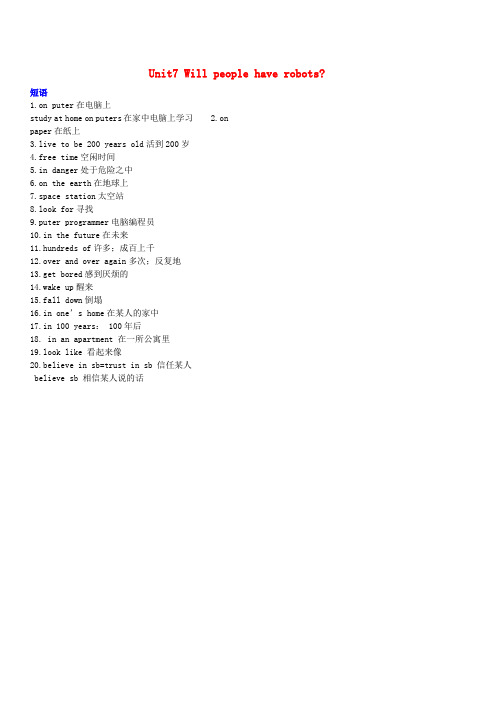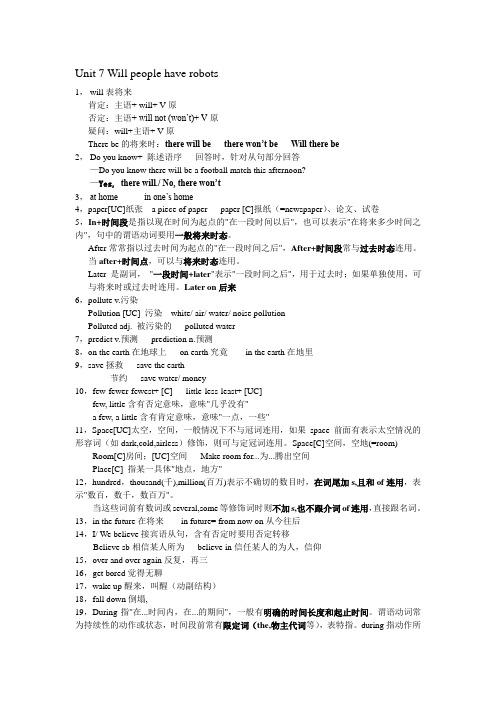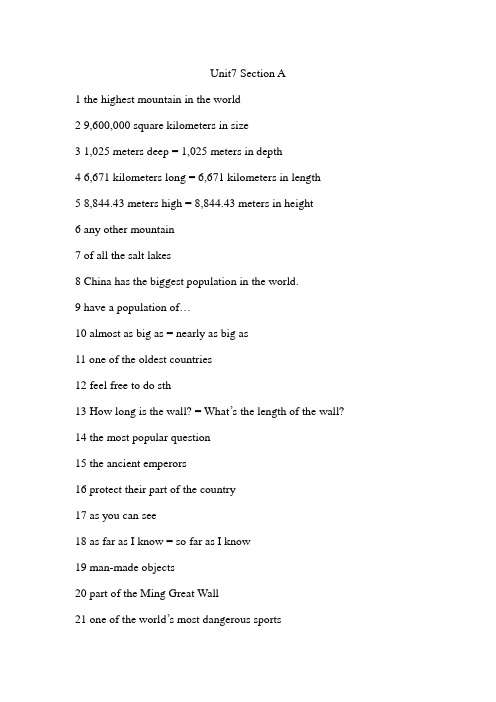新目标英语八年级第7单元知识点总结
- 格式:doc
- 大小:82.00 KB
- 文档页数:7

八年级上册英语第七单元笔记一、单元概述本单元主要讲述了英语语法中的现在进行时态,包括其构成、用法、注意事项等方面。
通过对本单元的学习,学生能够掌握现在进行时态的基本用法,能够正确使用该时态描述正在发生或进行的动作。
二、知识点详解1. 构成:现在进行时态由be动词(am/is/are)加上动词的现在分词构成。
2. 用法:用于描述正在发生或进行的动作,强调当前和正在进行的性质。
3. 副词修饰:现在进行时态可以用于修饰副词,表示动作的频率或程度。
4. 语境理解:在使用现在进行时态时,需要注意上下文的语境,确保表述的准确性和连贯性。
5. 否定表达:通常使用not/no+be动词的形式来表达否定含义。
6. 将来进行:表示将来某一时间正在进行的动作,构成与现在进行时态类似。
三、例句分析1. He is playing basketball right now.(正确) - 描述正在进行的动作,强调现在的状态。
2. They are often working late into the night.(正确) - 描述经常发生的动作,强调频率。
3. We'll be studying maths this afternoon.(错误) - 描述将来某一时间的动作,应该使用一般将来时态。
4. It is raining hard.(正确) - 使用现在进行时态描述天气的状态,强调雨势。
5. They are not coming to the party.(正确) - 表达否定含义,符合现在进行时态的否定形式。
四、练习与作业1. 请用现在进行时态描述你每天的学习计划和日常活动。
2. 请在作文中至少使用三次现在进行时态来表达正在进行的动作。
3. 比较一般现在时和现在进行时态的用法和区别,完成一份小报告。
4. 请分析并纠正以下句子的语法错误(至少三个):a. They watch TV every night.b. He is studying maths next week.c. We will go for a walk tomorrow afternoon.d. She isn't playing tennis this Saturday.e. They are playing in the park now.五、问题解答1. 疑问:现在进行时态的be动词是否可以省略?解答:在肯定句中,be动词不能省略,但在否定句中,可以省略not/no+be动词的形式。

人教新目标英语八年级上册Unit 7 Will people have robots?一、重点单词paper n. 纸,纸张future n. 将来,未来environment n. 环境earth n. 地球,世界space n. 太空,空间human adj. 人的 n. 人already adv. 已经,早已disagree v. 不同意,持不同意见during prep. 在……期间pollution n. 污染,污染物pollute v. 污染planet n. 行星peace n. 和平even adv. 甚至,连,愈加dangerous adj. 有危险的,不安全的believe v. 相信,认为有可能possible adj. 可能的holiday n. 假期,假日不可数名词paper pollution environment water air time spacepollute动词----pollution名词predicte动词---prediction名词peace名词----peaceful形容词danger名词----dangerous形容词factory名词-----复数factories agree-----反义词 disagreefall---过去式fellinside----反义词 outsidepossible----反义词impossible probable形容词-----副词probably human----复数humans前面加an 的名词有astronaunt apartment engineer article二、重点短语on computers在电脑上on paper在纸上a piece of paper 一张纸in the future 在未来in 100 years在一百年以后live to be 200 years old活到200岁in people’s home 在人们家里in an apartment在公寓free time空闲时间in danger处于危险之中in the world 在世界上on the earth在地球上play a part in sth参与某事on a space station在太空站in space在太空look for寻找computer pro电脑编程员grammer over and over again反复地get bored感到厌烦的wake up醒来look like看起来像fall down倒塌,摔倒in the country在乡村,在国家take a train to school坐火车去上学human servants人类仆人fly rockets to the moon放飞火箭到月球in dirty or dangerous places在脏或者危险的地方do simple jobs 做简单的工作do same jobs 做同样的工作the same …as …和…一样…will be polluted 将会被污染in great danger 处于极度危险中as soon(quickly/fast) as possible 尽可能快的 if possible 如果可能what will happen 什么将会发生fly to +地点==go to +地点 by plane/airwill+动词原形将要做 fewer/more +可数名词复数更少/更多……less/more+不可数名词更少/更多……try to do sth尽力做某事have to do sth不得不做某事agree with sb同意某人的意见such+名词如此……play a part in doing sth参与做某事make sb do sth让某人做某事help sb with sth帮助某人某事There will be +主语+其他将会有……There is/are+sb./sth.+doing sth 有……正在做某事It is +形容词+for sb +to do sth 做某事对某人来说是怎样的三、重点句子:1. -----What will the future be like ?将来会是什么样子的?----- Cities will be more pollution.And there will be fewer trees. 将来城市会污染得更严重,树木将会少得多。

Unit7 Will people have robots?短语1.on puter在电脑上study at home on puters在家中电脑上学习 2.onpaper在纸上3.live to be 200 years old活到200岁4.free time空闲时间5.in danger处于危险之中6.on the earth在地球上7.space station太空站8.look for寻找9.puter programmer电脑编程员10.in the future在未来11.hundreds of许多;成百上千12.over and over again多次;反复地13.get bored感到厌烦的14.wake up醒来15.fall down倒塌16.in one’s home在某人的家中17.in 100 years: 100年后18. in an apartment 在一所公寓里19.look like 看起来像20.believe in sb=trust in sb 信任某人believe sb 相信某人说的话用法:1.will+动词原形将要做……2.fewer/more+可数名词复数更少/更多……less/more+不可数名词更少/更多……3.have to do sth.不得不做某事(客观) must 必须(主观)5.There will be + 主语+其他将会有……6.There is/are +sb./sth.+doing sth.有……正在做某事7.make sb. do sth. 8.help sb. with sth.帮助某人做某事9.What will the future be like ? 未来将会是什么样子?10.Which side do you agree with ?你同意哪一方的观点?。

Unit 7 Will people have robots1,will表将来肯定:主语+ will+ V原否定:主语+ will not (won’t)+ V原疑问:will+主语+ V原There be的将来时:there will be there won’t be Will there be2,Do you know+ 陈述语序回答时,针对从句部分回答—Do you know there will be a football match this afternoon?—Yes,there will./ No, there won’t3,at home in one’s home4,paper[UC]纸张 a piece of paper paper [C]报纸(=newspaper)、论文、试卷5,In+时间段是指以现在时间为起点的"在一段时间以后",也可以表示"在将来多少时间之内",句中的谓语动词要用一般将来时态。
After常常指以过去时间为起点的"在一段时间之后",After+时间段常与过去时态连用。
当after+时间点,可以与将来时态连用。
Later 是副词,"一段时间+later"表示"一段时间之后",用于过去时;如果单独使用,可与将来时或过去时连用。
Later on后来6,pollute v.污染Pollution [UC] 污染white/ air/ water/ noise pollutionPolluted adj. 被污染的polluted water7,predict v.预测prediction n.预测8,on the earth在地球上on earth究竟in the earth在地里9,save拯救save the earth节约save water/ money10,few-fewer-fewest+ [C] little-less-least+ [UC]few, little含有否定意味,意味"几乎没有"a few, a little含有肯定意味,意味"一点,一些"11,Space[UC]太空,空间,一般情况下不与冠词连用,如果space前面有表示太空情况的形容词(如dark,cold,airless)修饰,则可与定冠词连用。

Unit7 Section A1 the highest mountain in the world2 9,600,000 square kilometers in size3 1,025 meters deep = 1,025 meters in depth4 6,671 kilometers long = 6,671 kilometers in length5 8,844.43 meters high = 8,844.43 meters in height6 any other mountain7 of all the salt lakes8 China has the biggest population in the world.9 have a population of…10 almost as big as = nearly as big as11 one of the oldest countries12 feel free to do sth13 How long is the wall? = What’s the length of the wall?14 the most popular question15 the ancient emperors16 protect their part of the country17 as you can see18 as far as I know = so far as I know19 man-made objects20 part of the Ming Great Wall21 one of the world’s most dangerous sports22 run along the southwestern part of China23 Thick clouds cover the top and snow can fall very hard.24 freezing weather conditions and heavy storms25 take in air26 the first people to reach the top27 succeed in doing sth28 risk one’s life29 challenge oneself in the face of difficulties30 achieve one’s dream31 the forces of natureSection B1 That panda weighs 100 kilos = The weight of that panda is 100 kilos.= That panda is 100 kilos heavy.2 That panda eats 10 kilos of food a day. / a kilo of…3 eat much more / eat much less / eat many times more4 at birth / be born / give birth to = have5 live up to 20 to 30 years / live to be… years old6 prepare milk for the baby pandas’ breakfast7 be awake / be asleep8 run over to them with excitement9 walk into sb10 fall over11 be so cute and lovely12 be special to sb13 There are now fewer than 2,000 pandas living in the forests.14 live in research centers in China15 every two years16 die from illnesses = die of illnesses17 eat about 10 kilos of bamboo18 cut down the forests19 endangered wild animals20 tell children about the importance of saving these animals21 a symbol of China22 try hard to help save the pandas23 better understand the habits of pandas24 jump high out of the water25 rules on whale protection26 stop putting rubbish into the sea27 protect whales from water pollution / protect…from/ against…28 even though = even if一1 Tom is taller than __ student in his class.A anyB the otherC any otherD other any2 Could you speak in a __ voice? We can hardly hear you.A friendlierB louderC softerD lovelier3--- Which one do you like __? --- Neither, thanks.A betterB the betterC bestD the best4 The store has __ the prices. The things there are cheaper than before.A keptB putC improvedD cut5 You are __ now, Victor. So you should wash your clothes by yourself.A enough youngB young enoughC enough oldD old enough6 How far is it from school? About __A 5 minutes on feetB 5 minutes walkC 5 minutes’ walkD 5 minutes-walk7 Shanghai is __ the east of China and Japan is __ the east of China.A in, inB to, toC to, inD in, to8 --- do you think is the best performer? --- Mary, of course.A WhoB WhenC WhatD Why9 There isn’t an airport near here. The __ one is about 90 miles away.A busiestB farthestC nearestD newest10 No ocean in the world is __ the Pacific Ocean.A big thanB biggest thanC as big asD as bigger as11 The clothes in this shop are cheaper than __ in that one.A thisB theseC thatD those12 Shanghai is bigger than __ in Japan.A any cityB any other cityC the other cityD the city13 There are much __ people in China than in American.A biggerB biggestC moreD most14 The population of China is much __ than that of American.A biggerB biggestC moreD most二1 Thursday is the __ (five) day of a week.2 The Himalayas run along the __ (southwest) part of China.3 When the baby pandas see the keepers, they run over to them with __ (excite).4 The main reason to build the Great Wall was to __ (保护) China.5 The Caspian Sea is the __ (deep) of all the salt lakes.6 Even more serious difficulties __ (包括) freezing weather __ (condition) and heavy storms.7 I like Chinese food better than __ (Japan) food.8 The baby pandas often die from __ (ill) and do not live very long.9 Scientists say there are now __ (few) than 2,000 pandas __ (live) in the forest.10 People want to challenge themselves in the face of __ (difficult).11 The world’s population __ (be) increasing faster and faster.12 About seventy percent of the population __ (be) farmers.13 The Yellow River is the second __ (long) in China.14 What’s the __ (weigh) of the elephant?15 This river is 20 meters in __ (deep).16 He is __ (good) of the two boys.17 This is one of __ (beauty) places.三1 What’s the population of China?__ __ __ are there in China?2 What’s the weight of the panda?__ __ __ the panda __ ?__ __ __ the panda?3 He is 1.62 meters tall.He is 1.62 meters __ __.4 This book is not as interesting as that one. This book is ___ ___ ___ that one.5 He is the oldest student in his class.He is __ than __ __ students in his class.__ __ is older than he in his class.6 I like books full of challenges and risks.I like books __ __ challenges and risks.7 Guangzhou is the south of China. Guangzhou is the __ __ of China.8 The music made her think about her family.The music __ her __ her family.9 He does his homework more carefully than his sister. His sister __ __ her homework __ __ __ he.。

八上英语第七单元笔记
以下是八年级英语第七单元的一些重要笔记:
1. 重点单词和短语:学习本单元时,需要掌握一些重点单词和短语,例如“listen”、“noise”、“disagree”、“matter”、“angry”等。
2. 语法结构:本单元涉及到了现在时和过去时的用法,以及一些基本的情态动词用法。
需要掌握这些语法结构的基本形式和用法。
3. 课文内容:本单元的课文内容主要围绕“解决分歧”这个主题展开,介绍了如何处理不同意见和分歧的方法。
需要理解课文中的重点句型和表达方式。
4. 听力训练:本单元的听力训练主要是围绕解决分歧展开的,需要听懂对方的意见和观点,然后提出自己的解决方案。
需要多加练习,提高自己的听力水平。
5. 写作训练:本单元的写作训练主要是围绕解决分歧展开的,需要写一篇关于如何解决分歧的文章。
需要掌握基本的写作技巧和表达方式。
6. 口语训练:本单元的口语训练主要是围绕解决分歧展开的,需要与同学或朋友进行对话练习,提高自己的口语表达能力。
以上是八年级英语第七单元的一些重要笔记,希望对你有所帮助。
八年级英语7单元知识点八年级英语第七单元主要包含家庭、亲友关系、家务、购物等方面的词汇和语法知识。
以下将分别介绍各个方面的重要知识点。
家庭和亲友关系:1. 家庭成员的称呼:father(父亲)、mother(母亲)、parents (父母)、grandfather(爷爷)、grandmother(奶奶)、brother(兄弟)、sister(姐妹)、uncle(叔父)、aunt(姨母)、cousin (堂/表兄弟姐妹)、niece(侄女)、nephew(侄子)等。
2. 家庭成员的性格描述:例如 kind(友好的)、funny(有趣的)、clever(聪明的)、patient(耐心的)等。
3. 亲友关系:例如friend(朋友)、colleague(同事)、classmate(同学)、neighbor(邻居)、partner(伴侣)等。
家务:1. 家务动词:cook(烹饪)、clean(清洁)、wash(洗涤)、iron(熨烫)、sweep(扫地)、mop(拖地)、dust(擦拭)等。
2. 家务名词:dishes(餐具)、laundry(洗衣房)、garbage(垃圾)等。
3. 家务表达:例如,I need to do the dishes.(我需要洗餐具。
)购物:1. 商店和店员的称呼:supermarket(超市)、salesperson(售货员)、cashier(收银员)等。
2. 购物动词:buy(购买)、pay(支付)、save(省钱)、discount(折扣)等。
3. 购物表达:例如,Do you have this in a larger size?(你们有更大的尺码吗?)此外,本单元还包括介绍人物的基本信息、介绍家庭成员、表达喜恶等方面的语法知识,例如句型What does he/she look like?(他/她长什么样子?)、I'm good at cooking.(我擅长做饭。
13 Unit 7 单元知识速记词汇精讲1. fewer, less与more表数量(1)few为形容词,带否定含义,意为“几乎没有;很少的”,修饰可数名词。
其比较级、最高级为fewer 和fewest;a few意为“一些”。
如:①He has few friends here.他在这儿几乎没有朋友。
②There will be fewer trees in the future.将来树木会更少。
(2)little为形容词,带否定含义,意为“很少的;几乎没有的”,修饰不可数名词。
其比较级、最高级为less和least。
A little意为“一些”。
如:①There's little food left. We have to buy some.几乎没有食物留下了,我们得去买一些。
②There's only a little water in the cup.杯子里只有一点点水。
③There will be less free time.空闲时间将会更少。
(3)many意为“许多”,修饰可数名词。
much 意为“许多”,修饰不可数名词。
many/much 比较级、最高级为more和most。
如:①There will be more people on the earth in the future. 未来地球上将有更多的人。
②There'll be more pollution in the future.将来会有更多污染。
2. hundreds ofhundreds of 意为“数以百计的”,在这里,hundred是名词,所以用复数。
如果hundred前面有基数词,说明hundred是数字,所以不能用复数。
如:①About three hundred of them left there.他们当中约有三百人离开了那儿。
②There are hundreds of books on the desk.桌子上有几百本书。
Unit 7 How do you make a banana milk shake?第1课时1、turn on 打开turn off 关闭turn up 开大点turn down 关小点2、cut v.切,割cut- cutting cut,cut up切碎cut down 砍倒cut off砍开cut sth into slices 把…剁碎3、peel v.刨,削,peel apples 削苹果4、pour v.泼,倒pour—pouring poured,pour…into…把…倒进…里eg: pour milk into the blender 把牛奶倒进搅拌器中。
pour …out of …,把…倒出…,pour out 倾诉,pour sb sth=pour sth for sb 给…倒…5、yogurt un.酸奶e g: a cup of yogurt 一杯酸奶6、ingredient cn.材料many kinds of ingredients 各种材料7、cup cn. 杯,a cup of tea ,一杯茶two cups of coffee 两杯咖啡8、watermelon cn.西瓜,many watermelons 许多西瓜9、teaspoon cn. 茶匙a teaspoons of honey 一茶匙蜂蜜three teaspoons of yogurt 三茶匙酸奶10、amount n.数量,a large amount of money一大笔钱11、instruction cn.命令,指示,用法说明,an instrction for the medicine ,药品的说明,some sug gestions for …,……的解决办法,a ticket for the concert,一张音乐会的票,the recipe for the food ,食物的做法,the answer to the question 问题的答案,the key to the door 门的钥匙,the solution for the problem 问题的解决办法。
新目标八年级上册Unit 7 Will people have robots? 讲义一、词性转换1.paper n. 纸张(不可数)2.pollution n. 污染物pollute v. 污染3.prediction n. 预言;预测predict v. 预测4.astronaut n. 宇航员5.dangerous a. 有危险的danger n. 危险6.disagree v. 不同意7.possible a. 可能的impossible a. 不可能的8.probably adv. 很可能二、短语归纳1.play a part 参加(某事)2.space station 太空站3.over and over again 多次;反复地4.hundred of 许多;大量5.fall down 突然倒下;跌倒6.look for 寻找;寻求7.in great danger 在巨大的危险中8.help with 帮助9.for example 举例10.in the future 在未来11.look like 看起来像12.wake up 醒来13.fewer people更少的人14.14. less free time更少的空闲时间15.15. in ten years 10年后(提问用How soon)16.fall in love with…爱上…17.hundreds of +名词复数数百/几百(概数,类似还有thousands of; millions of)18.the same as 和……相同19.A be different from B A与B不同20.wake up醒来21.get bored变得厌倦(get/become+形容词)22.keep a bird 养一只鸟23.lots of /a lot of许多+可数或不可数名词24.disagree with sb.不同意某人(的意见)disagree on sth. 不同意某事25.I don’t agree. = I disagree.我不同意26.on vacation度假27.help sb with sth 帮助某人做某事28.live in an apartment住在公寓里live on the earth 住在地球上29.besides与except =but(除…之外,不包括)30.be able to与can 能、会31.live on a space station 住在空间站32.over and over again 一次又一次33.10 years from now 今后10年34.be difficult to do 做……有困难35.the same …as 和……一样三、重难点深度解析1. Do you think there will be robots in people's homes? 你认为将来人们的家里会有机器人吗?Do you think...? 结构通常用来征求对方的意见或看法,后面接宾语从句,从句用陈述语序。
Unit7 Will people have robots?话题:预测未来一教学目标:一般将来时掌握灵活运用一般将来时态二教学重难点一般将来时三知识点1.一般将来时一、概念:表示将来某个时间要发生的动作或存在的状态,也表示将来经常或反复发生的动作,常与表示将来的时间状语连用,如tomorrow,next week,next year,in the future等。
I will go back to my hometown next week.下周我将回家乡。
一般将来时的时间状语标志词:○1.含tomorrow; next短语;○2.in+段时间○3how soon;○4.by+将来时间;○5.by the time sb.do○6.祈使句句型中:or/and sb. will do○7.在时间/条件状语从句中, 如果从句用一般现在时主句用将来时○8.another dayin 与after的区别是指以现在时间为起点的“在一段时间以后”。
也可以表示“在将来多少时间之内”,句子中的谓语动词要用一般将来时态;after常指以过去时间为起点的“一段时间之后”,所以它与过去时态连用。
当after指某个特定的未来时刻或日期之后,或指以将来某一时间为起点的若干时间之后时,它可以与将来时态连用。
例句:I'll be back in half an hour.我半小时后就回来本句中的in作"以后"解,不能用after代替。
after和in都可以表示"以后"的意思,其区别是:○1after以过去为起点,表示过去一段时间以后,常用于过去时态的句子。
Eg:They started working after lunch.他们是午餐后开始工作的。
○2in以现在为起点,表示将来一段时间以后,常用于将来时态的句子。
Eg:They will start working in half an hour.他们将在半小时后开始工作。
Eg:The film will be shown in 2 or 3 days. 这部电影将在两三天后上映。
○3在某个特定的时间以后,after也可用于将来时态的句子。
Eg:They will start working after 10 am. 他们将在上午10点以后开始工二构成:○1肯定式:1)主语+will/shall+动词原形+其他2)主语+be going to+动词原形+其他will用于各种人称,shall用于第一人称,be随人称、数和时间的变化而变化,will在代词后常简略为'll。
They'll have a test next week.他们下周要进行测验。
We will/shall visit the Summer Palace.我们要去游览颐和园。
I'm going to write a letter to my friend.我要给我的朋友写一封信。
○2否定式:在will/shall/be后加notThe boys won't play football this afternoon.这些男孩今天下午不踢足球。
I shan't go back to my hometown next Sunday.下星期日我不回家乡了。
He isn't going to water the flowers.他不打算浇花了。
○3一般疑问句:将will/shall/be提到主语前面Will the students watch the match?学生们要去看比赛吗?Are you going to visit your friends?你要去看望你的朋友们吗?1)“will/shall+动词原形”表示单纯意义“将来要(会)……”,没有计划性。
They will go with us.他们将和我们一起去。
2)“be going to+动词原形”表示“将要发生……”“打算、计划、决定要……”。
What are you going to do next Sunday?下个星期日你打算做什么?○4there be句型的一般将来时1)there be句型的一般将来时的构成是“There will be+主语+其他”,意为“将会有……”。
There will be a nice basketball match tonight.今天晚上会有一场精彩的篮球赛。
2)其一般疑问句形式为“Will there be+主语+其他”,其肯定回答是:Yes,there will.否定回答是:No,there won't.。
—Will there be a nice basketball match tonight?今天晚上会有一场精彩的篮球赛吗?—Yes,there will.是的,会有。
/No,there won't.不,没有。
2.live to be 200 years old 活到200岁Live to be +年龄/live to +年龄/live to the age of…均可表示活到多少岁Live to do sth. 为做某事而活着后面的不定式表目的Eat to live, but not live to eat. 人吃饭是为了活着,但活着不是为了吃饭。
Live的第三人称单数形式为lives, life 当生命讲时的复数形式为lives, 所以在不同的语境中要注意词性。
Eg. The doctor lives in a village. He saved many lives.那位医生住在一个村子里。
他救了很多人。
Live-living adj. 活着的-alive adj.活着的-lively adj. 活泼的Living 与alive两者都是形容词,且意思都是活着的,不同之处为living 可作定语和表语,alive 只能作表语。
Living people 活着的人们此时不能用aliveEg. After so many years. He is still alive. 这么多年后,他还活着。
Lively虽然ly结尾,但词性不是副词,而是形容词。
练习He is sure to live__________ninety years old.A.toB.to beC.inD.A and B3.in 100 years 在100年以后in 为介词,其后跟一段时间表示在……之后,通常用于一般将来时,对其提问时需用how soon练习1.__________will the manager come back?Maybe in three days.A.How oftenB.How longC.How soonD.How far2.The track meet will be held in Beijing ________about six weeks this year.A.atB.onC.afterD.in4.pollution 污染污染物不可数名词Atmospheric pollution 大气污染water pollution 水污染Ocean pollution 海洋污染noise pollution 噪声污染Eg. If everyone drives such cars in the future, there will be less pollution in the air.如果每个人在将来都驾驶这种汽车,空气中的污染会更少。
动词pollute 污染过去分词polluted 现在分词为pollutingAll these waste products are polluting the river.所有的这些废物正在污染者这条河。
5.human 人辨析human person peopleHuman 也可写作human being 复数human beingsThat was the beginning of the life of humans. 那是人类生活的开始。
Person 指个体的人,有单复数形式一个人a person 不能说a peopleEg. There were only two persons in the office yesterday afternoon.昨天下午办公室里只有两个人。
People 人,人们着重指集体,为集合名词也有民族之意复数形式peoplesEg. People are dancing in the street.人们正在街上跳舞。
There are 56 peoples in our country.我们国家有56个民族。
练习An old __________wants to see you.A.personB.peopleC.humanD.boy6.already still yetAlready 已经惊讶某事发生的实践比预期的早。
常用于完成时态,可放在助动词之后,过去分词之前,也可放在句末。
Eg. I have already finished my homework.我已经完成了作业。
Still 仍惊讶某事仍在继续,比预计结束的要晚Eg. She may be still at work.她可能仍然在工作。
Yet 已经还常用于完成时态之中,在疑问句句中意为已经,用在否定句中意为还,厂房在句末。
Eg. Jerry hasn’t been to that farm yet.杰里还没有去过那个农场。
Have you seen this film yet?你已经看过这部电影了吗?练习Holly has__________fed the dog, but she hasn’t watered the plants__________.A.still,alreadyB.already, yetC.yet, stillD.yet, already7.be able to 能够Eg. She was able to walk when she was only 10 months old .她10个月大的时候就能走路了。
Be able to 有人数和数的变化可用于多种时态,表示经过努力而成功的做成某事Eg. He will be able to sing this song is English next week.下个星期他将会用英语唱这首歌。
Can 没有人称和数的变化只有一般现在和过去式两种形式。
Can还可以表示请求,允许和推测,be able to 没有此用法。
Eg. Jim can’t speak Chinese.吉姆不会说汉语。